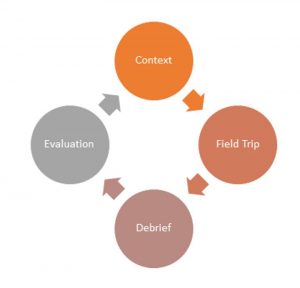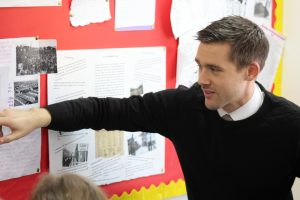reading time 9 minutes
I’m going to be blunt here.
Getting into teaching really is a rollercoaster of emotions. As cliché as it sounds, you will experience some serious highs and lows. Application comes with rejection, but it also comes with opportunity and a beautifully decorated stain-glass window to your future career.
So, let’s dive into the initial steps taken, to become teachers of the next generation…
- Decide that teaching is the right career for you
I’m going to be blunt here. If you’re questioning it, like really questioning whether this is the career for you, then either you’re not quite ready or maybe it’s not for you. I questioned it when I applied for my Undergraduate degree, despite which, I applied for Primary Teaching and as fate would have it, I didn’t get accepted. Instead, I was offered a place on the Special Needs and Education course (I’ll come back to this in a second as I know it may induce a raised eyebrow or two).
Even at the beginning of this academic year, I questioned whether this year was the right time for me to apply. But, after realising that my excuses were only covering up my fear of failure, I stopped putting off the inevitable and started the journey to my dream job.
The final thing that was hindering me, was my undergrad… I knew English was going to be the subject for me and originally, I thought the only way to teach this, was to do another degree, in English. Despite folklore, this is not the case (hurrah!). There are other options. For most subjects, you can complete a Subject Knowledge Enhancement course, or, if your training provider decides, you could be given subject based tasks to complete before you start to build on your subject knowledge.
Whatever is decided, if you want this career enough, if this is your dream career, there is nothing to stop you from achieving it.
- Sign up to EVERYTHING
There is so much online guidance and support. The two main sources that I used were the Department for Education’s Get into Teaching site and UCAS’ Train to Teach pages. (Shires TSA’s website also has a section specifically for Teacher Training!).
Get into Teaching provides you with a lot of support in a very helpful layout and if you register, which I recommend you do, you are likely to be provided with a DfE adviser. If you do get assigned someone, do use them!
Train to Teach has information about how to apply, your eligibility and explanations about the different routes into teaching. Which leads us nicely to…
- Discover and understand the different routes into teaching
At the beginning, I remember feeling completely overwhelmed by all the different routes into teaching. There are so many! But don’t stress. Research and read about them all. Completing step 4 is also going to help you understand the various routes, so that by the time you apply, you’ll know which is which.
- Attend events
The more the merrier (and the easier you’ll find providers who are suited to your needs and requirements). There are university events, focused mainly on the ‘core’ ITT route. I went to Leicester University for my first event, purely because it was close to me and I was way too excited to sit and wait until a Train to Teach event near me.
I found Train to Teach events the most useful to go to. Shires TSA was at Coventry Train to Teach – so, naturally, I cannot recommend going enough.
There is a presentation, which will explain the different routes into teaching, as well as the way the bursaries and scholarships work (ears pricking up now?).
Take your personal statement with you, even if it’s a very rough first draft – bullet point ideas if you have nothing. There are advisers who can give you support with the writing and ensure you highlight your best self without the waffle.
Finally, there are plenty of providers from the area with representatives who you can have a chat with. The only advice I have for this is to try and make a good impression. Be aware that what you wear reflects how seriously you expect to be taken. The providers are trying to impress you and make you want to train with them but you should reciprocate – they might just remember you when you turn up to an interview…!
- Register with UCAS
ARGH! It’s becoming real. Don’t worry. There are more videos on UCAS giving you step-by-step guidance on the application process. Your personal statement is the one thing that UCAS can’t help you with – but you have had support from a DfE advisor and you can definitely ask friends and family to have a read through; they are your biggest fans and will support you.
Have a think about the kind of impression you want to make. Professionalism is key, and buzzwords are great, but remember to make it personal.
- Apply!
It’s time for the difficult (or perhaps very easy?) decision. There is no right or wrong choice. It’s entirely up to you who you want to apply with. You have three choices and, honestly, just go with your gut.
Think: when you saw the providers at events, which one did you imagine yourself training at? You will have spoken to their representatives, who may have been teachers or members of senior staff at the schools – who can you imagine yourself working with? Who would you be most excited to work with?
- Choose your referees
For some people this part is hard. And that’s okay. One is academic and the other professional. Choose two people you trust and who are reliable and honest.
The most frustrating part about applying is when one of your referees is taking a lifetime to write their reference for you. You can’t send your application until they have sent their reference and if they make you wait you will be very aware of the clock ticking. My advice is to ask them in plenty of time so that the request isn’t a surprise and ensure they understand their timing is critical.
- Gain experience
This is your chance to get in the classroom! Email schools in your area and ask for a week or two of experience. Your old school is fine but, if you can and feel confident enough to, I suggest going to a different school – it will give you a wider perspective and you won’t feel as awkward walking into the staffroom!
A big challenge here, especially if you have a job or a lot of studying to do, is juggling your experience with other commitments. Get into a school one day a week, or even one morning or afternoon a week, and the hours will soon tally up.
In the school, be proactive – question current teachers about their own motivations and aspirations, talk to teaching assistants about their experiences and finally, ask to be placed in a variety of classes. The more you experience in terms of ability and age, the more prepared you will feel when you start your course.
One last point… if the school cannot place you into your subject for every lesson it’s not the end of the world – you will absolutely still learn from those teachers.
- Practice and pass your skills tests
I stressed so much about the skills tests, especially the numeracy one. I hadn’t looked at a Maths equation since my GCSEs (and hadn’t really planned to!), but it’s a necessity and brings you one step closer to putting a big gold star on your career goals page in your journal… no? just me? Alright then…
I passed my literacy test first time (woo) but decided within the first ten minutes of my numeracy test that I had failed (boo). However, I didn’t give up, and instead treated the remainder of the test as a practice. I relaxed and didn’t take it so seriously. Ironically, I passed (double woo!). My advice therefore, is try to chill out before the tests. Treat your first attempt as a practice round – if you pass, amazing! If not, you can try again, feeling a little more prepared the second time around.
My only other advice for you: practice. Every. Single. Day. There are past papers online that you can use to find your weaknesses. YouTube is also a goldmine when it comes to tactics (especially for the dreaded mental Maths!).
- Get an interview!
You are definitely allowed a little celebratory dance here!
- Prepare for the interview
This is when your adviser (if you’ve been provided with one) comes in handy – they can help you prepare. If you don’t have one, don’t panic! There’s a lot of other support online for you to use, especially the Times Education Supplement (TES) if your provider has asked for a lesson plan or delivery. And you can use your friends and family to ‘interview’ you and (yep, I really did this) to be your class for you to teach your lesson to.
Every provider is different and will request different activities for you to prepare and complete. Remember that they know that you are not yet qualified as a teacher, so don’t worry if you make a mistake!
Think back to teachers when you were at school and teachers at the school you did experience at… which qualities made them a good or bad teacher? What did they do in the classroom that was effective or ineffective? How did their pupils respond to them?
Finally, ensure that what you wear to the interview is professional, comfortable and makes you feel confident!
- Get accepted
You’ve done it. You can breathe! Anything that they ask for you to do over the summer, it’s a very good idea to do it. It will only help you. Apart from that, for now, relax.
It’s true, there are a huge number of obstacles in your way to becoming a teacher – but persevere. There are times when you might think “is all this going to be worth it?” (and this is just the application stage!). The answer is yes. Absolutely. The excitement of being accepted and the anticipation for starting will eclipse any doubt.
You are going to be a teacher. How good is that?!
by Suzy Watson – trainee teacher, English













